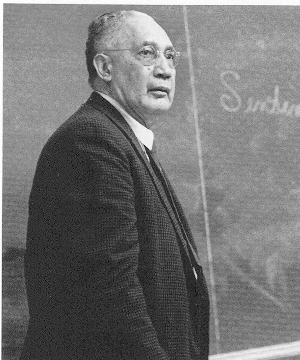The
verses resonate with the music of the life he saw around him--the blues
sung to lost loves, chants of saints praying to be in the number, tragic-comic
cries in the face of hatred and injustice, and jubilant songs of endurance
and perseverance. Sterling Brown's poetic genius lies in his subtle adaptation
of blues, spirituals, work songs, and ballads into silver threads that
dazzle his spoken verse.
"In
the beginning I never found poems in the American literary pantheon about
the things I knew best. I decided that I would at least do my part and
try to put some of those poems in there. At the time I was reading black
American literature, mostly in anthologies. I didn't know about Sterling
Brown. If I had, I would have taken a different approach...
"In
the 60s the critical thing in discovering the work of people who had preceded
me was going to the folk archives of the San Francisco Library and listening
to a recording of Sterling Brown and Robert Hayden. Not only did I get
a chance to follow that up by reading their poems in books and anthologies,
but I also heard their voices. That transformed a lot of things for me.
I realized there was a musicality, a certain kind of artistic rigor that
I hadn't heard before."
|
Biography
& Links:1.
Brief biography The
Black College Magazine Online.
2.
Biography at The Academy
of American Poets.
3.
Site with photo, biography, and bibliography of Brown
at Howard University Library.
4.
Introduction of Brown's life and writing at Lycos
Web Guide.
5.
Site, intended for teachers, but contains helpful discussions of Brown's
themes, style, audience, and other issues at The
Heath Anthology of American Literature in Georgetown University.
6.
Sterling Brown bibliography at Paul
P. Reuben Web Site.
Essays:1.
Online essay called "Poets
of the Harlem Renaissance and After" at The Academy of American Poets.
2.
Two
of Sterling Brown's own essays that relate to the blues:
| "Blues,
Ballads, and Social Songs."” Seventy-five Years of Freedom. Washington
DC: Library of Congress P, 1940. 17-25.
"The
Blues."” Phylon, XIII (Autumn 1952), 318-327 |
Poems:


